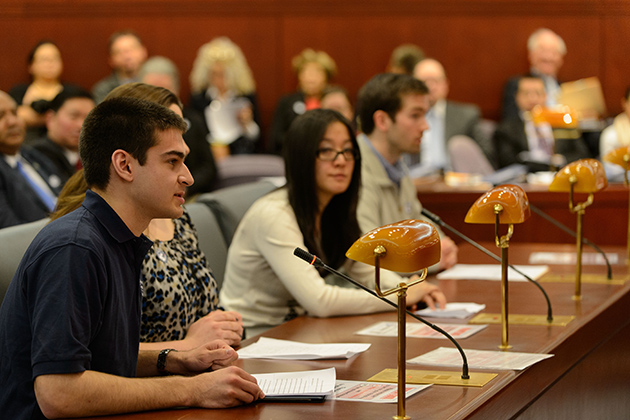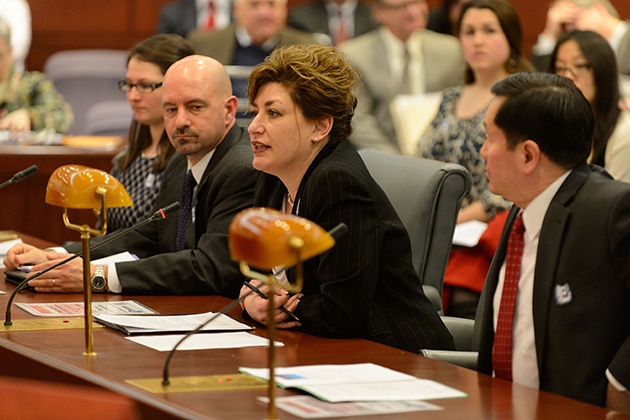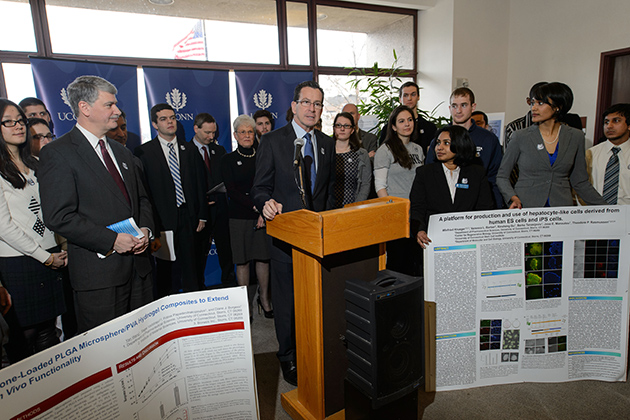
The halls of the state Capitol complex were awash in Husky blue on Monday, as scores of UConn students, their research advisers, alumni, corporate leaders, and others gathered to voice their support for the Next Generation Connecticut proposal and urge lawmakers to approve it.
The proposal (#NextGenCT) is a multi-faceted $1.5 billion initiative to build Connecticut’s economic future and job creation prospects through strategic investments in science, technology, engineering, and math disciplines (STEM) at the University of Connecticut.

Gov. Dannel P. Malloy, UConn President Susan Herbst, state Senate President Pro Tempore Donald Williams, and others are urging the General Assembly to adopt the plan during its current session, which included a hearing Monday in which Herbst and Provost Mun Choi testified before the legislature’s committee on finance, revenue, and bonding.
Several UConn students also testified at the hearing in person or submitted written statements for lawmakers’ consideration, and joined a large crowd of UConn supporters for a news conference Monday in the Capitol’s Legislative Office Building to share their support for the initiative.
“We are confident this plan will benefit every UConn student regardless of their major,” said Michael Daniels, external affairs chairman of UConn’s Undergraduate Student Government, which sponsored the news conference. “Adding new faculty through this initiative will help continue to reduce the student-faculty ratio, which will help UConn rise in the national rankings of public universities, joining schools like Berkeley, Michigan, and Virginia near the top.”

The news conference also included remarks from Malloy, Williams, Mansfield state Rep. Gregg Haddad ’89 (CLAS), student Monica Smith ’14 (ENG), and Flemming Tinker, president of Durham-based Aperture Optical Sciences Inc., one of many high-tech startup businesses whose owners support the NextGen initiative based on its potential to build the economy and provide a high-skilled, homegrown workforce.
College of Liberal Arts and Sciences Dean Jeremy Teitelbaum, School of Engineering Interim Dean Kazem Kazerounian, and many others also testified Monday before the legislature’s finance committee, which is considering whether to endorse a bill for the funding portion of the NextGen proposal.
This is not a plan that’s picking winners or losers. It is a victory for everyone in Connecticut.
Herbst, Choi, the deans, the students, business owners, and others emphasized that the initiative is not only about building UConn’s strengths. In the broader sense, it’s about using those strengths as a tool for Connecticut’s overall economic development, job creation, and business innovation.
“It is now Connecticut’s time to act. We want to catch up to great states and leap ahead in key areas like genomics, materials science, cognitive neuroscience, marine science, and digital media,” Herbst told the lawmakers Monday. “Next Generation Connecticut will make that happen, and this initiative will finally enable us to reach the top. Connecticut deserves to have a great top public research university that leads scientific discovery.”

Herbst and others also returned Tuesday to the state Legislative Office Building to appear before a subcommittee of the legislature’s appropriations committee, whose endorsement also is necessary before NextGen can advance to the full General Assembly for consideration before the legislature adjourns at midnight on June 5.
“This is important for everybody. This is important for every generation. This is important for every job that will be created or retained in the state of Connecticut,” Malloy said Monday of the NextGen proposal.
Williams and Haddad also emphasized the importance of the job creation aspects of the plan, saying that making the investment now will pay off for decades to come.
“When we think about the Next Generation project, it really is about the next generation: It’s about where we want to be as a state in terms of providing our students, the children of Connecticut, with the opportunities they will need in a global economy tomorrow,” Williams said.

Haddad called it a “tremendously important initiative” and praised the students at Monday’s event for their willingness to advocate for the proposal, saying their voice could make the difference between whether the legislature approves or rejects it.
NextGen includes expanding enrollment and faculty; renovating and adding appropriate facilities; expanding the Stamford campus curriculum with a strong focus on digital media and business programs and the addition of housing; and the relocation of the Greater Hartford campus to a yet-undetermined site in downtown Hartford.
The NextGen investments would represent one of the most ambitious programs launched at a public research university in recent years, and include the establishment of the first honors program nationwide specifically for high-achieving STEM students.
Some specifics of the NextGen plan include:
- Increasing total enrollment by 6,580 (30 percent). Of those, almost 3,300 would be STEM students, including 70 percent more engineering students. About 5,000 of the students would be enrolled at the Storrs campus, and about 1,500 would attend UConn in Stamford.
- Revolutionizing STEM infrastructure at the Storrs campus by building facilities to house materials science, physics, biology, engineering, cognitive science, genomics studies, labs, and related disciplines. Aging infrastructure would also be updated to accommodate new faculty and students.
- Creating the nation’s premier STEM honors program, including a residential learning community in which those students can share their experiences, innovative ideas, and camaraderie beyond the classrooms and labs in which they will study.
- Hiring 259 new faculty members in addition to the 290 already in the current faculty hiring plan. Of the 259 additional new faculty hires, 200 would be dedicated specifically to STEM programs. This would be on top of the 175 STEM-specific faculty members already being hired under the previously announced faculty hiring plan.
In addition to bolstering job creation in high-tech STEM fields and driving innovation, Next Generation Connecticut would create 30,000 construction jobs through 2024.

“To those who reasonably ask can we afford this right now, I say we cannot afford to wait any longer,” Daniels told the crowd at Monday’s news conference.
“This is not a plan that’s picking winners or losers,” he said. “It is a victory for everyone in Connecticut – a victory for students whose degrees will be more valuable, a victory for employers who will have a better educated workforce from which to choose, and a victory for taxpayers who stand to see a return on their investments.”


